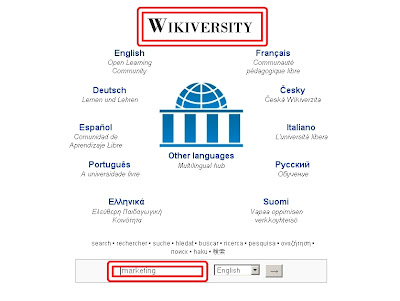WikipediaFor anyone who doesn’t know what is Wikipedia, it is a free, web-based, collaborative, multilingual encyclopedia project supported by the non-profit Wikimedia Foundation. Its 16 million articles (over 3.3 million in English) have been written collaboratively by volunteers around the world, and almost all of its articles can be edited by anyone with access to the site (source:
wikipedia)
 Wikiversity
WikiversityI’ve been surfing around “Wikiversity” (part of Wikipedia devoted to learning resources, learning projects, and research for use in all levels) and found that there wasn’t a section about digital marketing, and so I created one, hoping to use this as another platform to share the knowledge about digital marketing. Thus, anyone who feels like contributing can join.
How to contribute?

4. Click the “Digital Marketing” under the “Learning project” section at the bottom right corner

5. You will find that there are some texts, which I have already posted earlier. To edit the page click “edit the page” on the tab at the top of the page, or to edit a section by clicking “edit” at different heading. There are some empty headings I created for anyone to fill in.

6. You will find yourself on a page that looks like this…

Currently there are empty topics about “Search Engine Optimization,” “Email Marketing,” “Online Advertising,” “Online Newsletters” and “Media News Rooms.” Feel free to add or change.
7. To add a new heading, use the “=” sign. For example “=Social Media=” (for Main heading) and “==Social Media==” (for a subheading)
8. For more information about the page formats including references and heading, go to
http://en.wikipedia.org/wiki/Help:Wiki_markup or
http://en.wikiversity.org/wiki/Help:Editing9. If you’d like to keep track of the page you’ve edited, click on the “watch” tab at top of the page. This will keep you update for the change that others made.
Once you are familiar with these simple steps, there are much more of what you can do, you might decide to create your own subjects which is non-marketing related or you might want to have a look in other fields such as Wikinews, Wikitionary, Wikiquote or Wikibooks. Where I encourage those of you who have never contributed to contribute and please feel free to share with us!
Enjoy!
Teacup.










